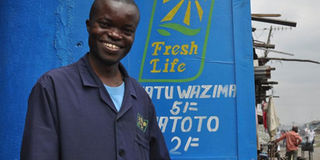He covered his nose and now uses toilets to make money

Alex Wekesa poses next to one of his toilets at Mukuru Kwa Reuben slums. He is a beneficiary of the fertiliser making toilets. The project aims at giving residents a means of earning a living while keeping the environment clean. PHOTO/FILE
What you need to know:
- A sanitation firm is giving residents a means to earn a living.
- Wekesa is a beneficiary of a project whose idea was introduced by Sanergy, a sanitation company.
- But Githinji admits it might be a challenge selling the idea of a fertiliser made from human waste to the average farmer.
Alex Wekesa, a resident Mukuru Kwa Reuben slums runs a unique business.
He owns two toilets that are part of a system whose end product is fertiliser.
He is a beneficiary of a project whose idea was introduced by Sanergy, a sanitation company.
It aims at giving residents a means to eke a living while keeping the environment clean.
Instead of using the conventional septic tanks, pit latrines, or sewer systems Sanergy introduced a waterless design that uses plastic containers for waste collection.
This made it easier to cart away the waste to a central processing facility.
Visits them
The toilet is designed in such a way that solid and liquid wastes end up in different containers.
Instead of the conventional flush, a user sprinkles the waste with sawdust that is provided.
The firm has contracted several people like Wekesa in the slum who operate more than 250 toilets.
A team that uses carts for transport visits them and exchanges filled-up cartridges for empty ones.
At the central processing facility, the solid waste is emptied into specialised wooden boxes lined with plastic sheets on the inside.
Here, the waste stays for a minimum of six months, mixed with natural fibre additives. It is occasionally aerated so that it eventually turns into fertiliser.
“So far we have not started selling the fertiliser as we are in the process of having it certified by the Kenya Bureau of Standards,” says Sanergy’s marketing manager Joseph Gitihnji.
Communications Manager Nicole Parisi-Smith says they have been running tests to make sure that it’s safe and has no pathogens.
She adds they are ready to start selling the fertiliser once it is certified.
Challenge
But Githinji admits it might be a challenge selling the idea of a fertiliser made from human waste to the average farmer.
“Initially we will be targeting the big farms such as flower farms who understand that the product is completely safe,” he adds.
But in the meantime, Wekesa says the most pressing problem is financing the toilet which costs Sh50,000 in an area where most residents live below the poverty line.
He charges Sh5 for adults and Sh2 for children. He makes a minimum of Sh350 from the two units daily.




